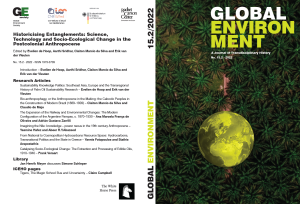Coordinators
- Erik van der Vleuten (PI)
- Frank Veraart (Secretary)
Key publication
Program aim
Sustainability, inequality, and well-being challenges should not be studied in temporal or geographical isolation. Through transcontinental resource supply chains and other 'sustainability telecouplings', the ongoing histories of modernization, inequality, well-being and (un)sustainability in the global North and the global South became deeply entangled. The GREASE program (Global resources and sustainability of European modernization) builds a research network and research agenda to explore entangled sustainability histories across the global North-South divide, and connects to present-day policy and stakeholder debates on inequality, well-being and sustainability challenges.
Network
Through a series of workshops, GREASE brings together scholars working on resource history, anthropology, science and technology studies, sustainability monitoring, and more; initiates a dialogue between European and non-European scholars; and organizes a debate between scholars and several societal stakeholders, including resource policy makers and statistical offices working on sustainability and well-being monitoring.
Project duration & funding
Project duration: 1 October 2018 - 30 September 2022
The GREASE program is funded through the Netherlands Research Council NWO Internationalization humanities networking program.
Program coordination
Erik van der Vleuten (Eindhoven University of Technology), Project Leader
Frank Veraart (Eindhoven University of Technology), Project Secretary
Co-funding co-applicants: Andreas Fickers (University of Luxemburg), Aristotle Tympas (National and Kapodistrian University of Athens), Dagmara Jajeśniak-Quast (Europa-Universität Viadrina, Frankfurt O.), Pascal Griset/Leonard Laborie (University of Paris Sorbonne); Matthias Heymann (Aarhus University), Per Högselius (KTH Stockholm).
Other co-applicants: Dirk Jan Koch (Netherlands Ministry of Foreign Affairs, Elena Kochetkova (), Jan-Pieter Smits (Statistics Netherlands), Maria Paula Diogo (New University of Lisbon), Urban Wråkberg (Arctic University of Norway).
Meetings
- FINAL CONFERENCE: The program results and follow-up initiatives will be presented and discussed at the 10th Tensions of Europe Conference: Technology, Environment and Resources (Aarhus, June-July 2022)
- Online workshop Entangling Technological Infrastructures, Material Flows and Modernities (July 2, 2021)
- Online workshop Data as a new resource? Similarities and differences of data vs. material resources (30 June 2021)
- Online workshop Resources & infrastructure in the postcolonial Anthropocene II (6 May 2021)
- Online workshop Resources & infrastructure in the postcolonial Anthropocene I (November 10-13 2020)
- Workshop Resources, Infrastructures and the Anthropocene: Dialogues between the Global-North and the Global-South (Caparica Campus, Faculdade de Ciências e Tecnologia da Universidade NOVA de Lisboa, Portugal 18 - 20 September 2019).
- Workshop Perceptions and constructions of resources, resource crises and resource futures: looking at the Arctic and other spaces. Aarhus University, 8-9 November 2018
Publications
- SPECIAL JOURNAL ISSUE Evelien de Hoop, Aarthi Sridhar, Claiton Marcio da Silva, Erik van der Vleuten (eds.), 'Historicizing entanglements: Science, Technology, and socio-ecological change in the postcolonial Anthropocene.' Global Environment. Journal of transdisciplinary history 15.2 (2022)
- Historicizing entanglements: Science, Technology, and socio-ecological change in the postcolonial Anthropocene. Introduction– Evelien de Hoop, Aarthi Sridhar, Claiton Marcio da Silva and Erik van der Vleuten
- Sustainability Knowledge Politics: Southeast Asia, Europe and the Transregional History of Palm Oil Sustainability Research – Evelien de Hoop and Erik van der Vleuten
- Bio-anthropophagy, or the Anthropocene in the Making: the Caboclo Peoples in the Construction of Modern Brazil (1889–1939) – Claiton Marcio da Silva and Claudio de Majo
- The Expansion of the Railway and Environmental Changes: The Modern Configuration of the Argentine Pampas, c. 1870–1930 – Ana Marcela França de Oliveira and Adrián Gustavo Zarrilli
- Imagining the Nile: knowledge – power nexus in the 19th century Anthropocene – Yasmine Hafez and Abeer R.Y.Abazeed
- From National to Cosmopolitan Hydrocarbons Resource Space: Hydrocarbons, Transnational Politics and the State in Greece – Yannis Fotopoulos and Stathis Arapostathis
- Catalysing Socio-Ecological Change: The Extraction and Processing of Edible Oils, 1910–1940 – Frank Veraart
-
SPECIAL JOURNAL SECTION Anna Åberg and Frank Veraart (eds.), ‘Creating, Capturing and Circulating Commodities: The technology and politics of material resource flows, from the 19th century to the present’. Special section of The Extractive Industries and Society Vol.7. nr.1 (2020): 1-67.
-
Frank Veraart, Anna Åberg, Hanna Vikström, "Creating, capturing, and circulating commodities: The technology and politics of material resource flows, from the 19th century to the present", The Extractive Industries and Society Vol.7. nr.1 (2020): 1-7.
-
Alexandra Bekasova, "From common rocks to valuable industrial resources: Limestone in nineteenth-century Russia." The Extractive Industries and Society Vol.7. nr.1 (2020): 8-19.
-
Hanna Vikström, "Risk or opportunity? The extractive industries’ response to critical metals in renewable energy technologies, 1980-2014", The Extractive Industries and Society Vol.7. nr.1 (2020): 20-28.
-
Anna Åberg, Maja Fjӕstad, "Chasing uranium: Securing nuclear fuel on a transnational arena in Sweden 1971–1984", The Extractive Industries and Society Vol.7. nr.1 (2020): 29-38.
-
Karl Bruno, 39-49
-
Frank Veraart, Jan-Pieter Smits, Erik van der Vleuten, "Connected by oil: A framework to analyze the connected sustainability histories of the Niger and Rhine Deltas, 1950-2015." The Extractive Industries and Society Vol.7. nr.1 (2020): 50-67.
-
-
ESSAY Erik van der Vleuten, “Technology, Societal Challenges, and Global Sustainability History”, ICON: Journal of the International Committee for the History of Technology 24 (2019): 34-52.
